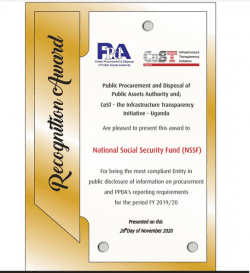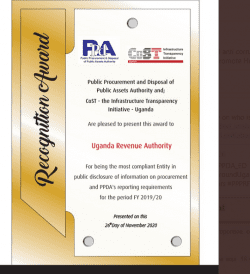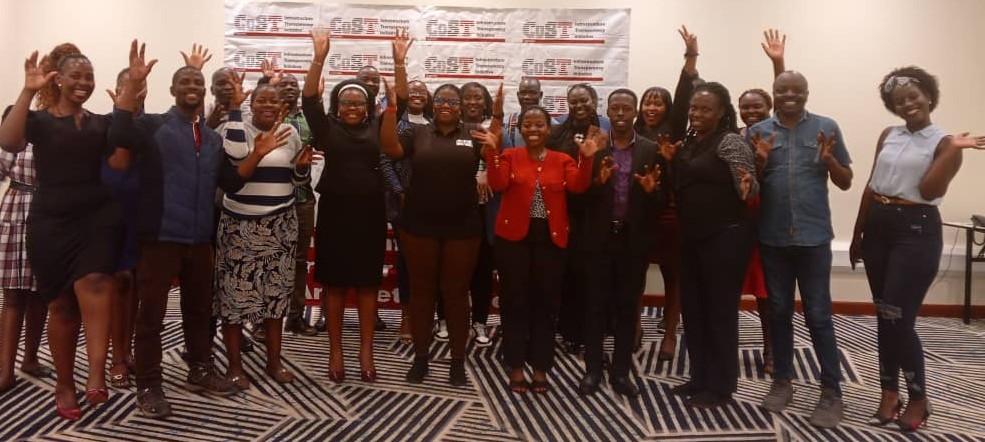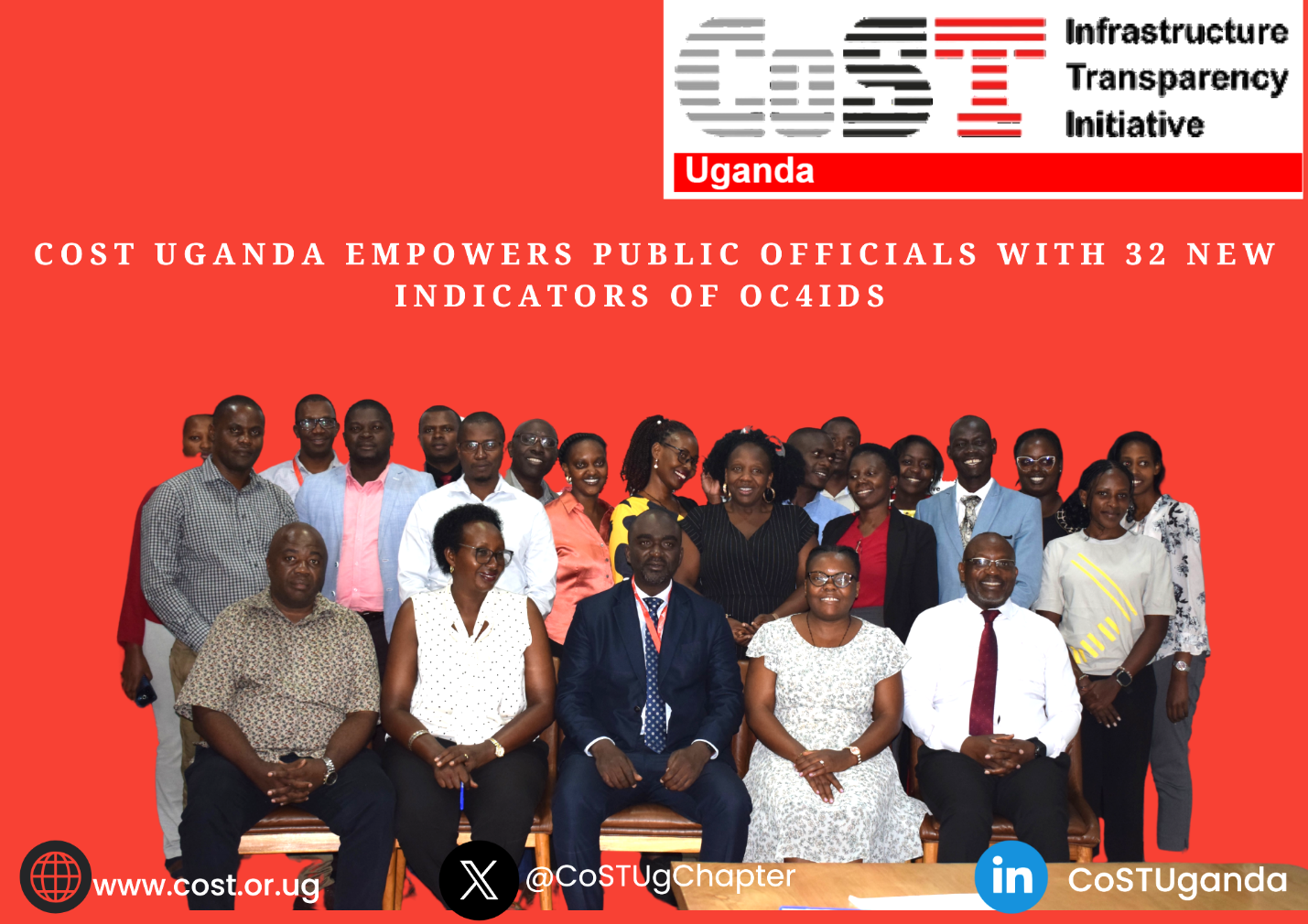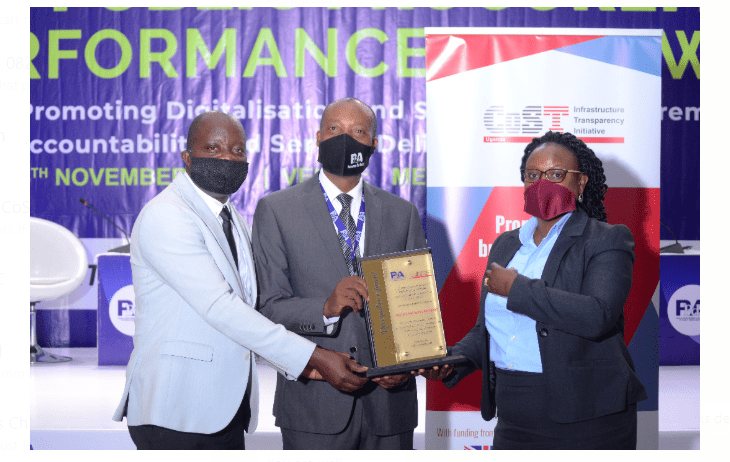
On 26th November 2020, at the 12th Public Procurement Forum, CoST – the Infrastructure Transparency Initiative Uganda partnered with the Public Procurement and Disposal of Public Assets Authority (PPDA) to reward and recognize Most compliant Public Entities in Disclosure of Procurement Information and PPDA’s reporting requirements for the period, 2019/2020. This follows a commitment from Government to provide incentives for public entities to disclose information on public infrastructure projects, at the CoST Uganda reflection meeting for the Business Integrity Initiative action held on 13th August 2020. The rewarding process results from the need to put in place incentives for Procurement Entities to publish procurement data as a means of promoting access to information for more businesses to engage.
Four Procurement Entities were rewarded including two Local and two Central Governments. The Most compliant entities include, Mbale and Kiboga District Local Governments, Uganda Revenue Authority and National Social Security Fund under the Central Government Category.
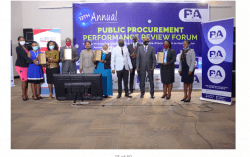

In his remarks, the Hon. Minister of Finance, Planning and Economic Development expressed concern that Transparency and accountability in public procurement was low, “I must express my concern, as a direct beneficiary of one of the roads in my constituency that could not be delivered in time, due to competing interests amidst the stakeholders that led to lengthy administrative reviews for two years affecting productivity of agricultural yields and causing huge losses”.
Government plans to put in place guidelines/regulations for handling procurement of highly complex projects such as Dams, railways characterized by large value and are complex, finalize amendment of the PPDA act to increase efficiency through reduction of some timelines and lengthy administrative review processes. The Minister asked PPDA and Procurement Entities to find quick solutions to delays in procurement, poor contract management, and poor market surveys, poor quality procurement outcomes, low returns on investments and poor implementation of mostly, infrastructure projects.
Emphasizing Government’s commitment to fair business practices, competition, value for money, and enhancing local content, he noted that “Nobody should bring here anything that is produced here, charity begins from home, why should you award a contract to someone abroad who is producing iron bars which are produced here, if quality is the issue, then we shall argue about that, local companies should improve their quality to international standards” He also added that, Government will strengthen skilling of locals to build the workforce and cautioned the private sector to be mindful on the quality of work they deliver as this has a direct impact on their future business opportunities.


A local procurement system has been developed by Government and is being piloted in 12 entities. The system will be rolled to each entity in the following two years. Government is also committed to address delays and lengthy administrative processes, adoption of E-Governance Procurement to ease information dissemination, measures will be put in place to secure the E-Procurement system from technological breakdowns and blocking bad elements from hacking into the system, this will enhance efficiency of all aspects of the procurement cycle. The Minister of Finance asked public officials to be efficient, faster, serve their country diligently and utilize the existing potential. Government approach has shifted to programme based approach from a sector wide approach. Planning and budgeting has been according to sectors and henceforth Government will be planning according to programme, there are 18 programmes, this will address issues of duplication, where different sectors were doing same things across board.
In his remarks the Executive Director, PPDA, Mr. Benson Turamye expressed concern that the PPDA Survey revealed that, the overall public procurement system performance in regards to transparency and accountability, findings were not impressive, only 24% of the public viewed Public procurement system as transparent with 76% viewing it as public procurement prone to corruption tendencies, an increment from 72% in 2014/15. This is measured through publication of the procurement related information. In regards to competition, the number of bids was 3 against the targeted number of 5, a decline from the 4 received in 2018/19. Open competition was 71.4% against the target of 80% meaning more entities are embracing open methods of procurement, and that high value procurements go through open bidding. Local content performance was at 58% against the target of 65% of the value of contracts have been awarded to local providers, when you look at the numbers, it is 97%. However, this requires further categorization to understand who the actual local – local providers are with companies owned by Ugandans. Regarding to utilization of procurement budgets performance on this indicator is not good.
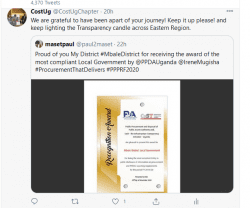

Stakeholders at the forum committed to strengthen supervision, monitoring and evaluation, building and using accountability platforms, capacity building and involvement of non-state actors in monitoring of contracts, strengthening internal administrative controls to ensure efficiency of the public procurement system. PPDA will be issuing new areas of reservations schemes for local content, compliance monitoring, enforcing the application of the social, environment, and social safe guards in the bidding documents, these have already been included in the bidding documents and PPDA will be auditing these areas as well, PDEs were encouraged to implement these provisions in the procurement process.
The Procurement entity rewarding process has been an incentive for entities that engage in the CoST Uganda Assurance process to publish information and enhance stakeholder participation in monitoring infrastructure projects. CoST Uganda has been recognizing entities that perform very well proactively and reactively in the Assurance process; such entities would receive awards as most infrastructure transparent entities. Entities that have received these awards have been steadfast in embracing the CoST features. The weight of this award has been so valuable to the entities for it builds public trust in them, and associates with their performance, the award comes with a public proclamation on the good performance of the entity at the Assurance report launch officiated by the CoST Champion. CoST reports and publications have been highly valued and appreciated by stakeholders in the sector. Everyone would want to associate with good institutions. The CoST award process is taken as a good practice for scale up.
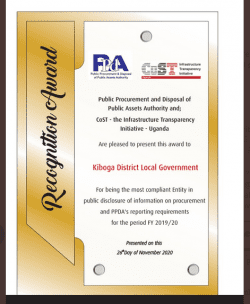

We are glad that Government agreed to scale up this initiative as an opportunity to encourage entities to publish project and contract information. The first award process has focused on compliance with disclosure and PPDA reporting requirements and this will eventually grow into other categories, with various incentives to be planned for by Government following 2020. We commend PPDA for embracing it. We commit our continued support in strengthening the award process in promoting transparency in public procurement. We are pleased to contribute towards the development and institutionalization of transparency initiatives in Uganda, we are hopeful, that the more entities open up, the more the businesses will be available for the private sector (local and foreign) to engage and we will be able to see a level playing field for the private sector.
